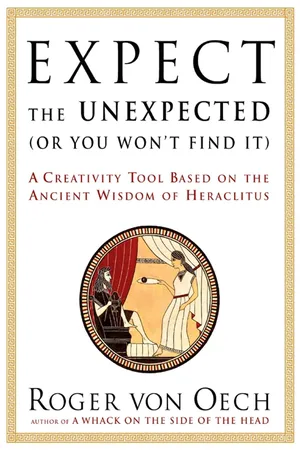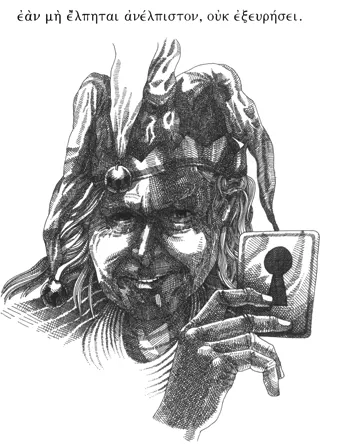![]()
The Creative Insights of Heraclitus
CREATIVE INSIGHT #1
“The cosmos speaks in patterns.”
FIND A PATTERN. If the cosmos reveals its secrets to us in patterns, then we need to listen for them. Indeed, we should use all of our senses. Fortunately, much of what we call “human intelligence” is our ability to recognize and discover new patterns. This is an important power; based on these patterns, we form our expectations of what we think we’ll experience as we go about the business of living.
For those of you who like pattern recognition puzzles, here are two. First: the letters of the alphabet can be grouped into four different categories: (1) A, M; (2) B, C, D, E, K; (3) F, G, J, K, L; and (4) H, I. Figure out the pattern, and place the remaining thirteen letters in their appropriate categories. Second: find what the following words have in common: laughing, starburst, calmness, crabcake, stuffed, canopy, hijack.
We find patterns all around us. We see similarities: stellar galaxies and water emptying out of a bathtub both spiral in the same way. We calculate probabilities: the more graffiti on the back of a road sign, the more difficult it will be to hitchhike a ride from that spot. We observe tendencies: terminally ill nursing-home patients are more likely to die after a holiday than before. We recognize self-fulfilling prophecies: people who are interested in synchronicity find meaningful coincidences almost everywhere. We see relationships: the tighter a government’s restrictions on its press, the less prosperous that society is likely to be.
We figure out sequences: Fibonacci numbers consist of adding together the two previous numbers to create the current one: 1, 1, 2, 3, 5, 8, 13, 21, 34, 55, 89, 144….* We arrive at correlations: on the whole, bigger animals such as whales, elephants, and humans live longer than smaller animals such as mice, hummingbirds, and snakes. We discern behaviors: people in crowded elevators tend to look at the ceiling. And we discover personal inclinations: when I’m hungry or tired I’m more likely to get irritated.
How do we find patterns? Often they just pop into my head. But I also find them by getting into a “pattern-seeking” frame of mind. First I notice something that has occurred more than once. Then I focus my thinking and look for or remember other things related to it. Yes, it’s a wonderful arrangement the human mind and the cosmos have: once we start looking for patterns, the cosmos accommodates us by letting us find them!
Indeed, have you ever noticed that when you learn a new word—say “zygote” or “equanimity”—you proceed to hear or think of uses for that word a half dozen times in the next few days? Similarly, when you’re looking for a new car and you narrow the choice down to a single make and model, you’re likely to see that type of car at every traffic light. What patterns do you see in your current situation? What patterns do you expect to see? How are these expectations guiding your thinking?
FIND A REASON. Let’s go one step further. Life can be seen simply as a series of events that just happen. But if we heed Heraclitus’ advice and look for patterns, we may discover a larger logic at work. Remember the old adage, “Once is an instance, twice may be a coincidence, but three or more times make a pattern.” What story do you think the cosmos is telling you? Have you noticed any “coincidences” in your daily life that suggest the existence of a larger pattern?
CHANGE YOUR VIEWPOINT. TO discover new patterns, often it’s necessary to change our point of view. An illustration of this is a story told by psychiatrist Paul Watzlawick about a strange phenomenon that took place in Seattle in the late 1950s. It seems that people began discovering small pockmarks on their car windshields. As more and more of these tiny indentations were found, the public became alarmed. Two theories arose to explain the pitting. Some said that atomic tests by the Russians had contaminated the atmosphere and this, combined with Seattle’s moist climate, had produced fallout that was returning to earth in a glass-etching dew. Others speculated that tiny residual acid drops from Seattle’s recently constructed roads were being flung against the windshields. As Seattle drivers worked themselves into a frenzy, the federal government sent a team of experts to investigate the mystery. Their finding: the windshield pitting was an old phenomenon, not a new one. All windshields develop “scars” as a car ages; it’s part of the normal wear and tear on a vehicle.
This is a good example of a kind of mass hysteria. How did it develop? As the reports of the windshield pits came to the attention of more and more people, they checked their own cars, usually by looking through the glass from the outside of the car. From this vantage point it’s easy to see the pitting, which is usually invisible from the inside. What had broken out in Seattle was an epidemic not of windshield pitting, but of reverse windshield viewing. By changing their point of view, people discovered something that had always been there but they had never noticed. What patterns might you discover if you change your point of view?
FIND A PATTERN IN MANY PLACES. One method I use to open my mind is to look at a single pattern in many different contexts. For example, let’s take a look at the magnificent number 12. It’s quite useful for dividing: twelve of anything can be evenly split into halves, thirds, quarters, and sixths. But even more important, I believe that “twelve” is deeply embedded in the human psyche. Early humans must have been quite impressed with the relationship between the two brightest heavenly bodies, the sun and the moon. From the moment when the sun reaches its highest point on the meridian (noon on the summer solstice) until it does so again one year later, the moon waxes and wanes a total of twelve times. Twelve times! If, as Heraclitus put it, “The cosmos speaks in patterns,” then this very fundamental pattern must have had cosmic significance to early humans grasping for meaning.
“Twelve” is a pattern that manifests itself in life, nature, religion, mathematics, technology, design, and culture in many interesting and provocative ways. There are twelve months in a year, twelve hours on the face of a clock, and twelve signs of the zodiac. Achilles gave King Priam twelve days to prepare for his son Hector’s funeral in the Iliad. Twelve is the number of axes through which Odysseus had to shoot an arrow to win Penelope. A regular dodecahedron has twelve pentagonal sides. A musical octave has twelve chromatic tones. There were twelve tribes of Israel, twelve disciples of Jesus, and twelve men who have walked on the moon. The Twelver Shi’a Muslim sect believes that the Twelfth Imam (Islamic preceptor) did not die. There are twelve days of Christmas, twelve steps in recovery programs, twelve jurors on American juries, and twelve buttons on touch-tone telephones. A perfect game in bowling consists of twelve consecutive strikes. And finally, one more than twelve feels “unlucky.” Think of a pattern or concept. How does this pattern find expression in different arenas of life? Do any of these manifestations provide an insight into your own situation?
CREATIVE INSIGHT #2
“Expect the unexpected, or you won’t find it.”
DROP AN ASSUMPTION. Folklore has it that explorer Christopher Columbus challenged some Spanish courtiers to stand an egg on end. They tried but were unable to keep it from rolling over. Columbus then hard-boiled the egg and squashed one end of it to create a base. Not fair, the courtiers protested. “Don’t be silly,” Columbus replied. “You just assumed more than you needed to.”
Assumptions are one of the mind’s great success stories. They allow us to anticipate what will happen in a variety of situations and prepare appropriately. If, for example, your boss has been grouchy the last nine Monday mornings, then you’ll probably assume that this coming Monday morning isn’t the ideal time to ask for a raise. The trouble with assumptions is that the past isn’t always a reliable predictor of the future. The more assumptions we make, the more likely we are to see only what we expect to see, and the less likely we are to find the unexpected. (Maybe your boss won the lottery over the weekend. Or fell in love!)
A seminar exercise I like to do involves making paper airplanes. Here’s how it works: I assign the participants to different teams and give each team fifty sheets of paper. Then I draw a line at the back of the room. Each team has five minutes to see how many airplanes it can make that can fly past the line, and the one with the most is the winner. The most common approach is to fold the sheets into conventional paper airplane shapes. But the winning design, more often than not, is a sheet of paper that has been crumpled into a ball. The crumpled balls of paper invariably “fly” past the line—the only criterion that has to be satisfied in the exercise. And the losing teams immediately grasp that what most hobbled their thinking was their assumptions about what a paper airplane is supposed to look like.
Inventor Thomas Edison had a simple test he used to measure the “unexpectedness quotient” of prospective employees. He would invite a candidate to lunch and serve a bowl of soup. He would then watch to see whether the person salted his soup before tasting it. If he did, he wouldn’t be offered the job. Edison felt that people are more open to different possibilities if they don’t salt their experience of life before tasting it. What assumptions can you drop in your current situation? In what ways are you “salting your experience” before tasting it?
BE WILLING TO BE LED ASTRAY. When we go off the beaten path, we often find something better or more exciting than what we were originally looking for. For example, physicist Karl Jansky improvised a new antenna to study the effects of telephone static. Instead, he discovered radio waves from the Milky Way galaxy, and in the process helped create the science of radioastronomy. In 1856, chemist William Perkin searched for a synthetic quinine to combat malaria. Instead, he discovered a dyestuff (he called it “Mauveline,” which the public shortened to mauve) that was the first practical synthetic color. In 1984, biologist Alec Jeffreys studied the gene for the muscle protein myoglobin hoping to gain an understanding of how genes evolve. Instead, he stumbled upon a stretch of DNA in the middle of the gene that varied greatly from one individual to another. This led to his pioneering work in the creation of “DNA fingerprinting,” which has revolutionized not only forensic science but also other fields such as anthropology and epidemiology.
Think of the times in your own life when one thing has led to something entirely different. How did you get interested in your line of work? How about the times you’ve gone to the library in search of a particular book, and then found something even better on the shelf behind you? As writer Franklin Adams put it, “I find that a great part of the information I have was acquired by looking up something and finding something else on the way.”
How can we prepare ourselves for the unexpected? I suggest that we: (1) loosen our preconceptions about what we expect to find in any given situation; (2) pay special attention to the anomalous rather than ignoring it; and, (3) use what we discover as stepping stones to something very different. Why don’t we adopt this outlook more often? A major reason is that in order to get things done, we tend to filter out information that strikes us as “irrelevant.” Indeed, I find that I’m less likely to find the unexpected when I’m in a hurry or narrowly focused on a specific task. Conversely, when I’m relaxed or playful, there’s a greater probability that unexpected things will flow my way. In what new directions can your situation lead you? What might open up if you abandoned your original objective?
PREPARE FOR UNINTENDED CONSEQUENCES. Pursuing our dreams or trying to solve our problems in unusual ways can bring great rewards, but it can also lead to trouble. In fact, sometimes it can bring rewards and troubles at the same time! Remember the story of the ancient Phrygian king Midas? According to legend, Midas so loved gold that when the god Dionysus offered to grant him his deepest wish, he asked that all he touched be turned to this precious metal. At first, Midas was delighted with his wealth-creating power, but after discovering that his contact made food inedible and his embraces rendered loved ones lifeless, he soon realized that getting what you want can have unintended—and undesirable—consequences.
Sometimes the solution to a problem can even make the problem worse that it originally was. In the 1960s, engineers in what is now Bangladesh designed huge off-shore structures to protect coastal areas from the erosion caused by high tides and natural catastrophes. Unfortunately, the structures also encouraged a false sense of security, which led to massive “squatting” on nearby land. When a cyclone struck in 1970, it took the lives of nearly half a million people, in no small part because so many lived in unsafe coastal areas. Thus, the government’s efforts to protect residents had unintended consequences—they indirectly caused more deaths.
During the Soviet-Afghan war, the Soviets unleashed brutal attacks on the civilian population, believing that this would intimidate the Afghans into submission. Ironically, the attacks had an unexpected and opposite result. Because Afghan warriors traditionally stayed close to home to guard their families, the Soviets’ driving Afghan women and children into refugee camps liberated the Mujahideen from family responsibilities and turned them into a more formidable opponent.
Finally, the coach of a leading crew team invited a meditation instructor to teach awareness methods to his crew. He hoped that such training would enhance their rowing effectiveness. As they learned more about meditation, they became more synchronized and their strokes became smoother. The irony is that they went slower. It turned out that they became more interested in being in harmony than in winning. What might be the unintended consequences of implementing your idea?
PAY ATTENTION TO SMALL THINGS. In 1960, meteorologist Edward Lorenz was attempting to model weather patterns through computer simulation. He plugged data on wind sp...


